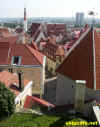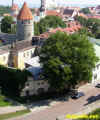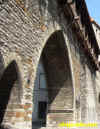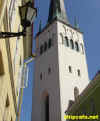| Much
like the other ports of call to come on this particular voyage, I
had not yet been to Tallinn, Estonia. On the morning of
Sunday, July 13th, 2003, I woke up at a fairly decent time and
went to the Lido Restaurant. I met up with Joanne and Karen
where we discussed a possible plan for our respective days in
Estonia. We decided that we would catch a taxi into town to
split the cost. The taxi dropped us off at a good location
at which to begin our exploration. Our walking began just
shy of Raekoja Plats.
|

|
|
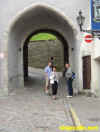
|
We
began to walk away from the Raekoja Plats area after exploring for
just a bit. We were quite confused at first as to which
avenue to follow. Many streets branch off into different
directions and it is very easy at first to get lost if one has
never become familiar with the area. I continued to watch a
couple of walking maps closely to make sure that we were putting
names to the sights. |
|
Note
Karen far ahead of us wondering if we plan to catch up! |
Tallinn is
certainly very medieval in appearance and definitely deviates from the
standard European feel of other cities on the itinerary. One of
the first main attractions that we arrived upon was the Aleksander
Nevsky Cathedral. The Nevsky Cathedral was built in 1900 and
designed by St. Petersburg architect Mikhail Preobrzhenski. It is
the main center for Russian Orthodoxy in Estonia.
|
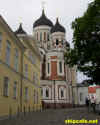 |
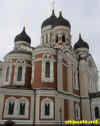 |
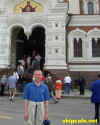 |
|
|
Approaching
the Nevsky Cathedral. |
Onion
domes top the Nevsky Cathedral. |
Myself
in front of the Nevsky Cathedral. |
|
The temperature in
Tallinn this particular day began to rise bit by bit the farther we
walked through the town. Shortly after visiting the Cathedral and
the Toompea Castle area, Joanne and Karen went off to do a bit of
shopping and sightseeing. I headed off as well to get more photos
and try to hit all of the major sights on my guide book list.
|
A
classic and medieval look dominates most all of the architecture
seen in Tallinn. |
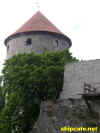 |
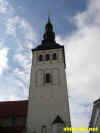 |
Located
at Pikk 48 is the 400-foot high Oleviste Kirk (St. Olaf's
Church). It was named after Norway's 11th century King Olaf
II. |
|
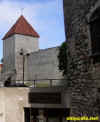 |
|
|
Kiek
in de Kök is an old cannon tower that dates from the late 15th
century. The whimsical name's actual meaning is 'peep in the
kitchen'. |
|
|
By approximately mid-day I found myself back around the Raekoja
Plats area where, by this time, many locals and tourists were
enjoying lunch as well as the warm sun.
|

|
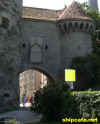 |
I
still had a couple of sights that I had wanted to physically see and
photograph so I proceeded away from the central region of the city
once again. I did, however, find a small shopping area in
which to check my e-mail at an internet café. It was very
inexpensive so I could easily rationalize the time. I had
wanted to find Fat Margaret as I knew that that is one of the most
popular tourist attractions in Tallinn. The Fat Margaret
Tower, restored several times in its long history, is most recently
known as the Estonian Maritime Museum. Nunna, Sauna, and
Kuldjala towers are nearby and are the oldest that still stand. |
 |
| After
having seen the main tourist attractions, I felt the desire to
branch off a bit and explore some more of the local attractions that
were not necessarily highlighted on tourist maps, etc. On my
journey away from the main city and toward the outlying areas, I was
interested to see a local tram car and see how some of the locals
travel on a day-to-day basis. |

|
 |
As
I continued to walk north and somewhat toward the cruise ships, I
wanted to explore one or two more sights. I happened across an
very interesting sight that I could not help walk through and
explore. At first, to me, it appeared as though it were a
completely abandoned building that had been closed for many
years. The physical structure seemed to be very old and it
almost has an eerie feel to it. Curiosity had the best of me,
however, to scale its steps and find myself at a heliport and other
features of this building. Later on I discovered that this
venue, The
Tallinna Linnahall, is actually a functioning performance hall
still very much in use. I suppose that that shows how modern
day, public buildings are just a bit less sophisticated than the
western world is accustomed to. |
 |
| Shortly
after that time I decided to walk back to the cruise ships. It
was fairly easy to locate the ships by sight and navigate toward
them but upon approaching the ships, it became a bit more
challenging. There is a layered pier structure where terminals
seemingly adjacent to the ship have no through access. I wound
up backing out of one area and walking completely around to find
access to the Noordam. In a short amount of time,
however, I found myself walking alongside the Noordam and
anticipating my trip up to the Lido Restaurant for lunch! |

|
|
The
boxy hull structure of Noordam's stern. |
The
scheduled departure time of Noordam from Tallinn was 5:00pm.
There was a wine and cheese party that took place just shortly before for
sail away. The evening overall was very low-key given that our next
port of call was going to be St. Petersburg, Russia. For a large
number of guests on board, the following port was the highlight of the
entire voyage. As we sailed farther east and north, it was
noticeable that it began to stay lighter longer into the evening. I
did not stay out very late this particular evening in preparation for the
long day ahead in St. Petersburg.
|








